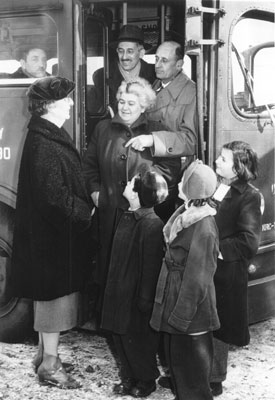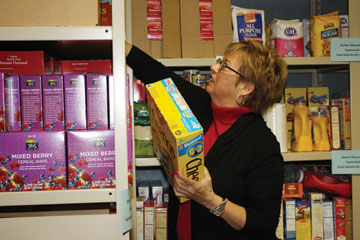 A lot has changed yet much has stayed the same in the 110 years since Jewish Family Services was established in 1901. JFS has been quietly celebrating this milestone anniversary throughout 2012 by making sure it’s strengthening its core mission of helping families.
A lot has changed yet much has stayed the same in the 110 years since Jewish Family Services was established in 1901. JFS has been quietly celebrating this milestone anniversary throughout 2012 by making sure it’s strengthening its core mission of helping families.
“We’re like a department store, we have lots of different services,” explained JFS Executive Director Don Goldman. “So we have a very broad mission of helping individuals and families cope with crises and life’s everyday challenges by providing essential programs and services for them.”
Originally known as United Jewish Charities and founded by William J. Berkowitz, it began when several smaller agencies merged to pool their efforts and their funds to help the wave of immigrants arriving here from Eastern Europe.
“One hundred and ten years ago we were the main Jewish agency in the city. Most of the other agencies have spawned from us. It was really a very different world then,” Goldman said.
“The Jewish community at the time was really all about resettlement and helping those who had recently come to the United States get the services they needed. Today almost everybody is settled and assimilated, so our issues now are much more social-services related and geared for a really different point in time for the Jewish community,” he continued.
Through the years and name changes — first to Jewish Family and Children Services and eventually to Jewish Family Services — the agency has always worked to strengthen and preserve family life.
“What’s interesting to me is how our work today has components that are both very similar and very different from what they were over the last 110 years. I read some case notes from 70 years ago that looked like they could have been written by a social worker this year dealing with a family in crisis over the loss of a job,” Goldman said.
JFS’ top executive is quick to point out that a few years ago the agency was not doing the best job it could to meet the needs of the time. So its staff and board set out to transform the agency, adding programs to specifically meet the needs of today’s Jewish community.
“We decided to increase our focus on older adults. Our community is aging, yet we didn’t have the range of services we needed to handle older adults’ needs,” Goldman said.
JFS launched new, innovative programs such as JET Express, which helps older adults with transportation when they can no longer drive for themselves. In addition Help@Home was established to allow older adults to stay comfortably in their home when they can no longer take care of it themselves.
As it went about this transformation, JFS looked to the other 120 or so Jewish social service agencies around the country to get a sense of what other agencies do.
“They create a model for us of all the things we might be doing. We are doing many things, but we are not doing everything that other people are doing. One of our challenges for the future is to continue to keep doing more and more for our community,” Goldman said.
JFS also handles situations that can’t be completely anticipated, such as the economic crisis that began in 2008.
“When I first arrived at JFS five years ago, we got 30 or 40 calls per month for help with various needs. By 2009, that number had grown to over 200 per month, and stayed at that level for three years. Many of those calls involved a loss of a job,” he said.
Not everyone needs help with a crisis, but Goldman wants JFS to be prepared for those who do.
“Those things have been the case for the whole 110 years. People get into financial crisis because they lost their job, or have a medical emergency or a variety of other reasons. The way we deal with it today is different than 110 years ago, but we are and want to be the place for people to come to deal with those things,” he said.
So in 2010, JFS partnered with Jewish Vocational Service to launch Jewish Employment Services to help people find jobs, particularly in this very tough environment. Since its inception, more than 165 people have found jobs through JES and hundreds more have received help with their resumes, networking tips and interviewing skills. In continued response to the economic crisis, JFS launched its Food Pantry this past year — an idea borrowed from other Jewish social service agencies — serving its first clients last month.
“We did that because we are filling a really important need in the community,” Goldman said.
Focus is families Stewart Koesten, JFS’ president, points out that whatever the agency does, it will always assist families.
Stewart Koesten, JFS’ president, points out that whatever the agency does, it will always assist families.
“Family is our middle name,” he said. “Whether it is classes or events or workshops, we work with families.”
He noted that the agency works with parents, married couples and young people just coming into marriage as well as children and seniors.
“Last year we served over 1,200 kids and their parents with a variety of programs and we partner with synagogues in the community with these programs. Family Life Education is a very large part of what we do,” Koesten said.
For many years JFS has also prided itself on the work it does regarding mental health issues. In fact Emilie Levin, the agency’s executive director from 1939-79, was the first professionally trained social worker to lead a social service agency not only in the Jewish community but the entire Kansas City metro area.
“We do quite a bit in the mental health area with our Mental Health Coalition, through Jewish Family Services partnering with with Catholic Charities and the Rabbinical Association to provide anti-stigma and mental health awareness programs. That’s a huge issue these days that we are involved with,” Koesten said.
Then and now
When the agency was founded Goldman noted that the Jewish community was very separate from the general community and couldn’t access many of its services, such as hospitals.
“That’s not an issue today. What’s also changed is JFS now serves beyond the Jewish community. In the life crisis area half of our clients are not Jewish,” he said.
As a founding member of United Way, JFS has actually served the general community for many years. Most other social service agencies in town — such as Catholic Charities and Lutheran Ministries — serve the whole community as well.
“It’s part of being in social service that while you want to serve your own community, you want to serve the whole community. … Our priority is to serve the Jewish community, but the spirit of tikkun olam enables us to serve everyone,” Goldman said.
Future challenges
As with any social service agency today, funding is one of JFS’ biggest challenges. Since JFS serves both the Jewish and general communities, it continues to look to both communities to find ways to fund its current programs as well as find funding so it can expand its programming. Goldman said the success of many JFS programs, especially in the area of older adults, has helped it raise funds in the general community.
“Because these are some of the most interesting, innovative services out there, we’re finding a lot of general community foundations are interested in funding them,” Goldman said.
As older, generous funders age, Koesten is hoping to find ways to interest younger generations in funding the agency.
“We face a future challenge of how are we going to raise money from a potentially diminishing source, or how do we train that community to recognize the need. I think both of those angles have to be attacked,” Koesten said.
In the future, Goldman sees even more expansion of its services to older adults.
“We’re all aging,” Goldman pointed out. “If you don’t need our programs now, your parents need them or eventually you will need them yourself.”
He also noted that many agencies across the country have more programs for the disabled than JFS currently has. That’s an area of service he would also like to see expanded.
Goldman believes JFS will continue to grow, adapt and change in the future in order to remain successful.
“The good news is that I think while we’re getting closer to the mark in terms of serving more and more of the needs,” he said. “I see us looking to provide more comprehensive services for older adults and I see more comprehensive services for people in crisis and generally for families throughout the life cycle.”


